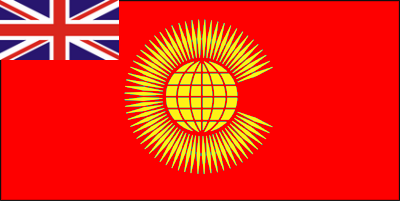Kaje, I am posting this for you to have some sort of idea as to your ancestor's world.
The British Commonwealth of Nations
The British Commonwealth of Nations was a collection of former colonies of the British Empire that had been granted or won their independance. India without the protection of it's former British masters was a ripe target for conquest.
After a close call with an aborted invasion attempt from it's neighbors the Indian Prime Minister called upon the support of fellow commonwealth countries to support each other, he was horrified when the British Government proposed to reconstitute the commonwealth along the lines of a federal government based on the United States of America.
Britain proposed to formly dissolve the remainder of it's Empire with each dependancy gaining it's independance following a set timetable, which would allow each country time to elect suitable canditates for self-government (suitable to the British Government that is) as long as they had the economic means to make independance work.
The former colonies were not required to join the commonwealth, although it was expected and history does not record any country refusing the honor. Britain's one stipulation was that the reigning monarch would become the head of the federal state, president of the super parliament. The other countries in the Empire and commonwealth jumped at this chance, Prime Minister Nehru a dedicated socialist had no choice but to go along, since all percieved it as his idea.
Each member country would continue it's own government, but would also contribute taxes, troops, and police to support the federal system. They would elect a representative to sit in the super parliament (as it became known).
It was decided that the Super Parliament would be based in Vancouver Canada, a more neutral location than Britain herself. Since most of the former colonies had little experience with self-government Britain and Canada offered to staff the super parliament from their own civil service, this was influential in making BCN policy very British or Canadian biased.
The federal government of the BCN was to be slightly different from that of the USA, or even the European Alliance, since the British Monarchy retained the presidency ad infinitum. There would be no Presidential elections, the general populace would instead elect a Commonwealth Member of Parliament (CMP) every 4 years.
Given that the British Monarch couldn't spend all of their time in Canada a ruling council was set up. Although any member nation was meant to be able to be elected to the council it usually fell to the most affulent nations.
Britain, Australia and Canada never failed to gain a seat on the ruling council. The council would then elect from amongst themselves a chairman who would be the Monarch's representative and was called 'The Chairman of the Ruling Council of the British Commonwealth of Nations', and not as they were sometimes referred to as the BCN Prime Minister.
The ruling council was made up of 7 seats and the chairman would serve for 4 years.
Since Great Britain was the dominant member nation, the BCN enjoyed a healthy alliance with the United States through the Anglo-American Defense Pact, which served both nations defenses up to the launching of the nukes in WW3.



